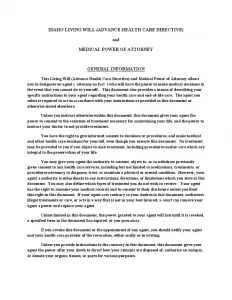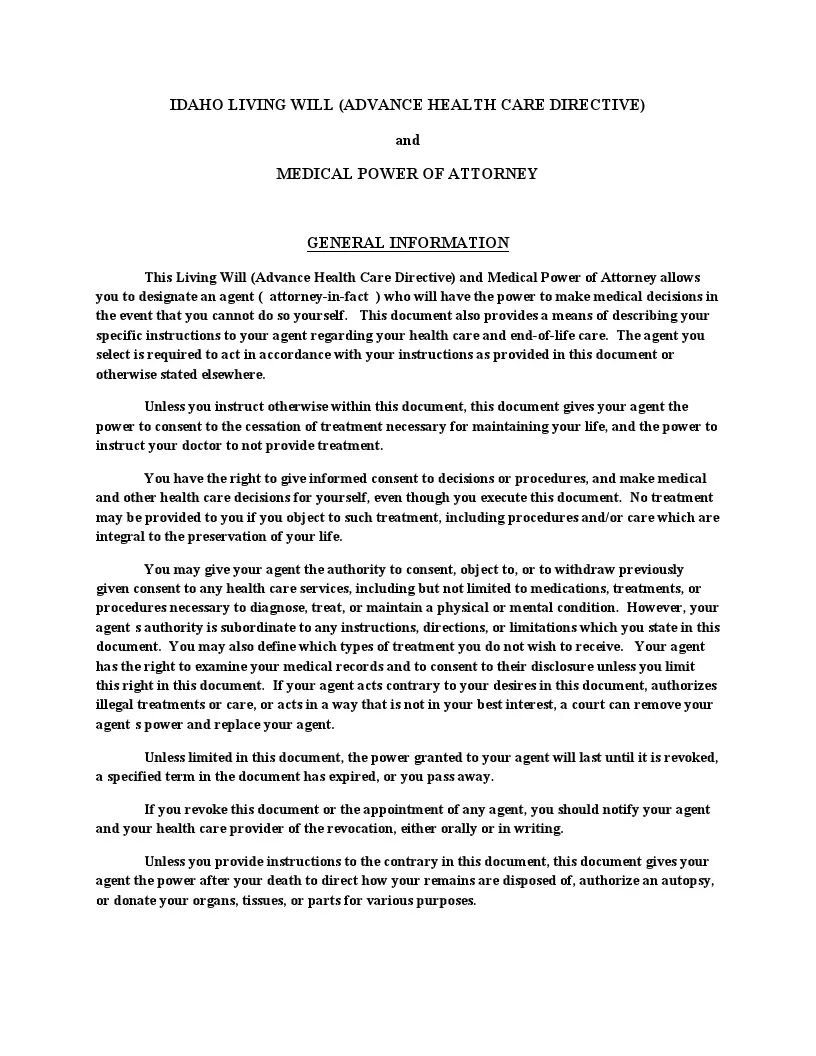Free Idaho Living Will Form
A living will in Idaho is a legal document that specifies a person’s wishes regarding medical treatment if they become incapacitated and unable to communicate their desires directly. This is part of what’s commonly called an advance directive.
In the Idaho living will form, you can also appoint a health care agent (known as a health care proxy or durable power of attorney for health care) to make decisions on your behalf if you are unable to do so.
Signing Requirements and Laws
Creating a valid living will in Idaho requires adherence to specific legal requirements outlined in the “Medical Consent and Natural Death Act,” specifically under Title 39, Chapter 45 of the Idaho Statutes. Understanding and following these requirements ensures that your living will is legally enforceable and that your medical treatment preferences are respected.
To begin with, you must be at least 18 years old and of sound mind to execute a living will, according to the Idaho Code. The living will must be a written document, as oral directives are not recognized as legally binding in Idaho. To be considered valid, an Advance Care Planning Document (ACPD) must include the following mandatory elements:
- Personal information. The document must include the name, date of birth, telephone number, and mailing address of the person for whom the ACPD was created.
- Signature. The document must be signed by the person creating the ACPD or their authorized agent.
- Date. The date on which the document was signed must be included.
These requirements are detailed in Idaho Code § 39-4510. While the notarization of a living will is not mandated by Idaho law, it is recommended for additional legal protection. Notarization can help prevent potential disputes regarding the document’s validity. Per Idaho Code § 39-4511A, an ACPD can be revoked at any time by the person who created it. Revocation can be done through:
- Physical destruction of the document (e.g., tearing, burning).
- A written, signed statement expressing the intent to revoke.
- An oral statement expressing the intent to revoke.
- Any other action that indicates the intent to revoke the document.
The maker of the revoked ACPD is responsible for informing their health care providers about the revocation.
Idaho Living Will Form Details
| Document Name | Idaho Living Will Form |
| State Form Name | Idaho Advance Care Planning Document |
| Signing Requirements | Two Witnesses |
| Validity Requirements | Section 39-4510 |
| State Laws: Idaho Statutes, Sections 39-4501 to 39-4516 | |

Steps to Fill Out the Form
Filling out the Idaho Advance Care Planning Document ensures that your health care preferences are documented and respected when you cannot communicate your wishes. Here is a step-by-step guide on how to complete the form.
1. Mandatory Provisions
Enter your personal information, including your full name, the directive date, address, telephone number(s), and birth date. This information identifies the document as yours and ensures it is properly attributed.
2. Nomination of Health Care Agents
In the section for nominating health care agents, provide details of the individual you appoint to make health care decisions on your behalf. Include their name, relationship to you, telephone numbers, address, and email address. Designate alternate agents if your primary agent is unavailable or unable to act. Provide the same details for each alternate agent.
3. HIPAA Release Authority
Complete the HIPAA Release Authority section to grant your health care agent the authority to access your medical records. This authorization ensures that your agent can obtain the necessary health information to make informed decisions about your care.
4. Prior Designations Revoked
Revoke any prior advance care planning documents or medical directives in this section. This action ensures that the current document is the definitive source of your health care wishes.
5. Resuscitation Instructions
Specify your preferences regarding resuscitation and artificial life-sustaining treatments in the Resuscitation Instructions section. Detail the conditions under which you do or do not want such treatments initiated or continued.
6. Pregnancy Instructions
If applicable, provide instructions regarding your care if you are diagnosed as pregnant. Indicate whether the advance directive should be honored, specify particular treatments to be withheld or withdrawn, or authorize your health care agent to decide on your behalf.
7. POST/POLST Form
State whether you have completed a Physician Orders for Scope of Treatment (POST) form. If you have, ensure it is referenced and compatible with your advance directive. If not, note that this document will be modified to align with any POST form you may complete.
8. Signature and Witnesses
Sign and date the document. Having your signature witnessed by two adults who meet the criteria outlined in the form is recommended. Optionally, have the document notarized for extra legal validation, though notarization is not required. Witnesses must be at least 18 years old, not related to you, not entitled to any part of your estate, not financially responsible for your medical care, and not your attending physician or an employee of your attending physician.

Below are various other Idaho templates completed by our users. Try our simple builder to customize these forms to your preferences.
